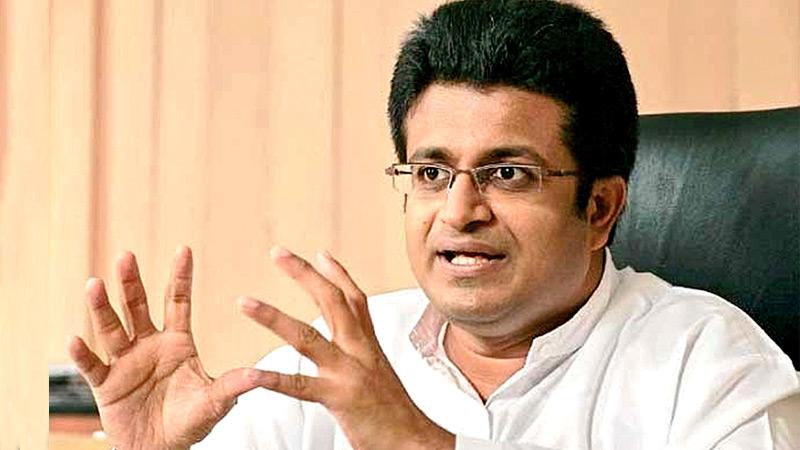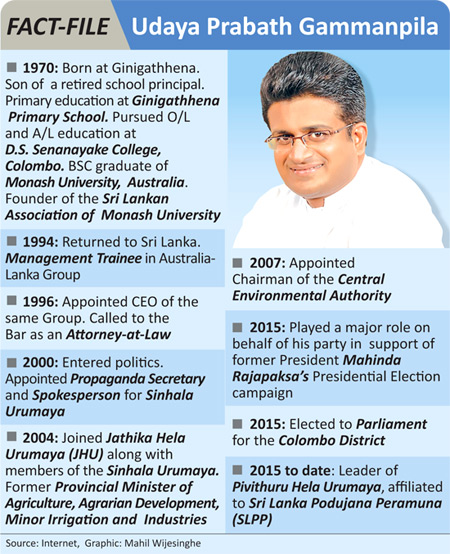
Pivithuru Hela Urumaya PHU Leader and UPFA Colombo District Parliamentarian Udaya Prabath Gammanpila said during the last three months, President Gotabaya Rajapaksa has demonstrated that he is a different leader not by words but by deeds as well. MP Gammanpila in an interview with the Sunday Observer said the President will maintain a very friendly but a firm relationship with the rest of the world, and he has brought with him the vision, discipline and professionalism to governance. The President has proved to the world that he is a different leader and as such, Sri Lanka will have a bright future under his stewardship. The cordial, closer relationship and mutual understanding between the President and the Prime Minister is crucial for the forward march of the country.
Excerpts from the interview:
 Q. How do you view President Gotabaya Rajapaksa’s Independence Day speech?
Q. How do you view President Gotabaya Rajapaksa’s Independence Day speech?
A. His speech has been admired and appreciated not only by the friends but also his arch rivals. The President through his speech displayed to the world what kind of a leader he is and what kind of a nation he is going to build. He first made it clear that he is above differences in society: ethnic, religious, linguistic and political parties. He showed that since he is above all these petty differences, he can be considered as the true father of the nation and irrespective of the differences everybody can unite under one umbrella with his leadership. Secondly, he sent a strong message to wrongdoers that he is strict not only in his talks but in his deeds. In view of the President’s speech, the international community has understood where Sri Lanka is going to be and what their role in Sri Lanka’s forward march. People after a long time are optimistic about their future. It has generated a lot of optimism among Sri Lankans as well as foreigners about Sri Lanka’s future.
Q. Are you confident of securing two thirds majority to execute Government development plans successfully? Do you see any obstacles to achieve your targets?
A. After the Proportional Representation system, no party has obtained two thirds majority in Parliament. I admit it is a mammoth task. On the other hand, the nation is burdened with the present Constitution, especially the 19th Amendment. It has created a three-headed executive. Those days, the President was the genuine head of the executive. But after the 19th Amendment, certain powers, such as recommendation of ministers has been vested with the Prime Minister. On the other hand, the selection of persons for the high posts is vested with the Constitutional Council headed by the Speaker. Although, the President has been elected by the people with a mandate to implement his election manifesto, he doesn’t have adequate power. Power has been devolved among the President, Prime Minister and the Speaker. Our executive has been weakened to a great extent.
Even former President Maithripala Sirisena said because of the 19th Amendment, the nation cannot move ahead without having a close relationship between the President and the Prime Minister. Fortunately, the Present President and the Prime Minister are brothers. They are not just brothers and they have been maintaining a very cordial relationship for the past 70 years. However, we can’t expect this scenario in the future. We can’t expect a tradition to get two brothers elected as President and Prime Minister. Therefore, we have to get rid of the 19th Amendment. For that, we need two thirds majority in Parliament. Usually, the JVP and the TNA always side with the UNP. Therefore, we can’t expect those parties’ cooperation to get rid of the 19th Amendment or to introduce a new Constitution. The people have the responsibility to provide us with a two-thirds majority. We try our best and at the same time, we do hope the people to be more sensible.
Q. Are you hopeful that the Gotabaya Rajapaksa era will make a difference compared to post independence 72 years of the country?
A. It is not a mere hope! It is a reality. During the past three months, President Gotabaya Rajapaksa has demonstrated that he is a different leader not by words but by deeds as well. He is the first Government official to be elected as the President. Secondly, he has a great foreign exposure since he had been living in the USA for the past 13 years. Most Sri Lankan leaders were suffering from Anglophobia. They were in fear of the western white skinned people. They were reluctant to make necessary decisions to safeguard our sovereignty against the western nations because of Anglophobia. Since he had been living in the USA for a long time, fortunately, the President didn’t have this problem. As far as I could say, this is the most significant feature in the character of President Rajapaksa. The President will maintain a friendly but a firm relationship with the rest of the world, and he has brought with him the vision, discipline and professionalism to the governance. He has demonstrated to the world that he is a different leader, and Sri Lanka will have a bright future under his leadership.
Q. Do you think the bureaucracy needs to be fine-tuned to fast-track President’s development plans, including elimination of constraints, such as red tape, bottleneck?
A. Of course, the President is doing it. We should not underestimate the President’s ability to fine-tune the Government machinery because he had done it twice in the past. When he was tasked with the office of the Defence Secretary, there was a situation of military lethargy with a mentality that the war was not winnable. They were mentally down and their morale was low. He transformed the low morale of the military to a war-winning force within two to three years. He made the impossible, possible. I am a nationalist as well as an environmentalist.
As a nationalist, I believed the LTTE could be defeated. But being an environmentalist, I didn’t believe we could get rid of the waste problem in the Colombo city. We defeated terrorism by force, but we can’t change the cultural habits by force. We have to be much more strategic for that. Our approach should be much more humane. Gotabaya Rajapaksa was assigned with the Ministry of Urban Development, and in his capacity as the Secretary, within three years, he not only got rid of the garbage problem but also restored the drainage system and Colombo became one of the cleanest cities in the world. He received awards for it. He is reputed for fine-tuning the broken-down machinery. Since he has fine-tuned two machineries, the defence and the urban development, now he is in overall charge.
Q. The ‘President-Prime Minister’ political combination augurs well for the country in decision-making and plan implementation. Your views?
A. The cordial relationship and mutual understanding between the President and the Prime Minister is crucial for the forward march of the country. Fortunately, President and the Prime Minister are not only brothers and they have a good mutual understanding as well. The President’s forte is administration, and of course, he is an able administrator. On the other hand, Prime Minister Mahinda Rajapaksa is the best politician in the country. I don’t think a politician of the calibre of Prime Minister Rajapaksa would be there for several decades. I think this will be a fine model for the future Presidents and Prime Ministers!
Q. If Sri Lanka is to be developed, bribery, corruption and kickbacks have to be rooted out. The Airbus deal is a classic case. What has the Government proposed to do in this regard?
A. On a directive by the President, the Government has launched an investigation. SriLankan Airlines has agreed to cooperate with any international or internal investigation in this regard. For the betterment of the country, we have to get rid of corruption. No nation has completely got rid of corruption, but there are so many nations which have minimised it to a great extent.
Q. What is the Government’s stand at the forthcoming UNHRC sessions in Geneva?
A. Actually when we were in the Opposition, we vehemently opposed the resolution 30/1 at the UNHRC, which was passed in 2015. We have not changed our stand. We are of the view that the Government should withdraw the co-sponsorship given to that resolution because the prime sponsor of the resolution, the USA has left the UNHRC calling it a ‘cesspit’. We have reasons to withdraw our co-sponsorship. With or without those resolutions, as a nation, we are obliged to protect human rights and democracy. We are for it. We don’t need lectures from the West for protecting human rights.
We have been greatly influenced by Buddhism. All these human rights which have been recognised by the United Nations around 75 years ago can be seen in Buddhist scriptures. We know how to protect human rights and practise democracy. We don’t need lectures from the West because they have not been able to maintain our standard. We are of the view that the Government should withdraw the co-sponsorship. It should be done in a way which would not antagonise any nation. We should not do it in a way which would damage the pride of any nation because we should be able to concentrate on our forward march without creating troubles. The Government should withdraw its co-sponsorship for the resolution 30/1 in a diplomatic manner.
Q. Would you like to comment on the never-ending crisis in the UNP high command? Has not the UNP lost its political identity?
A. The UNP is in a big trouble because the majority has no confidence in the leader. There is a strong group which has no confidence in the prospective leader, Sajith Premadasa because he failed to demonstrate leadership skills, such as giving leadership to his group and being tactful, truthful and strategic during the last Presidential Election campaign. A sizeable group of UNP leaders has no faith in the prospective leader. The UNP is leaderless. They don’t see a new potential, competent leader for the next 20 years. That is why there is a crisis in the UNP. If there is a proper leader to replace Ranil Wickremesinghe, he will not be able to hold on to his ground for long. The UNP’s real crisis is that there is no potential leader for the future. That is why the UNPers are frustrated and looking for other options, such as joining hands with us.
Q. Is there a Government mechanism to purchase paddy at the guaranteed price at the forthcoming Maha season without letting the middlemen exploit paddy farmers?
A. During the past five years, the former Government destroyed the state’s intervening mechanism since they were neoliberals who believed only in market forces. The governmental intervening mechanism and instruments had been destroyed. We are in a difficulty to restore it within months. But we are determined not to pass the burden on to paddy farmers. Somehow we will introduce a purchasing mechanism for paddy to ensure a minimum guaranteed price.
Q. Has the country’s financial capability improved to meet its commitments? If not, are we to seek foreign aid to bridge the gap?
A. As you know, add to the former Government’s inefficiency, we had to face the Easter Sunday attacks as well. It is of course, a result of the former Government’s ignorance and inefficiency. It may take some time for us to recover. Fortunately, the entire world has placed confidence in us. Investor and tourist arrivals are on the increase. The Sri Lankan business community has begun to reinvest in their business enterprises. We are optimistic about the future. For the short term, we may need foreign aid to bridge the gap, but we rely more on investments than loans.
